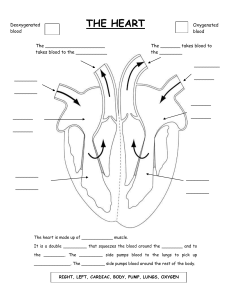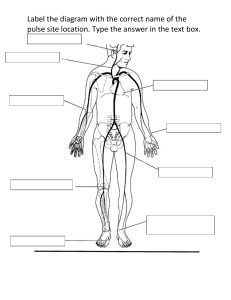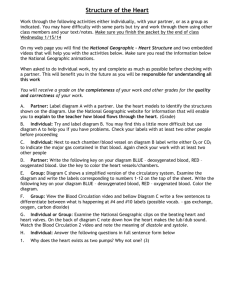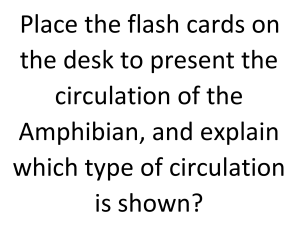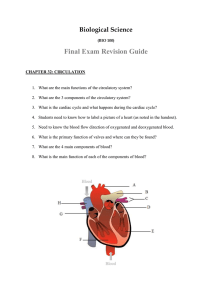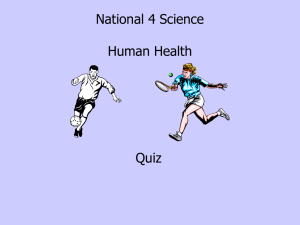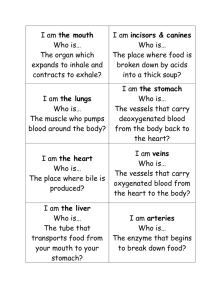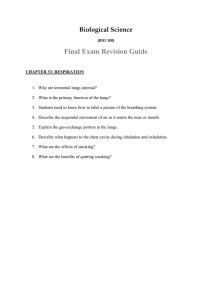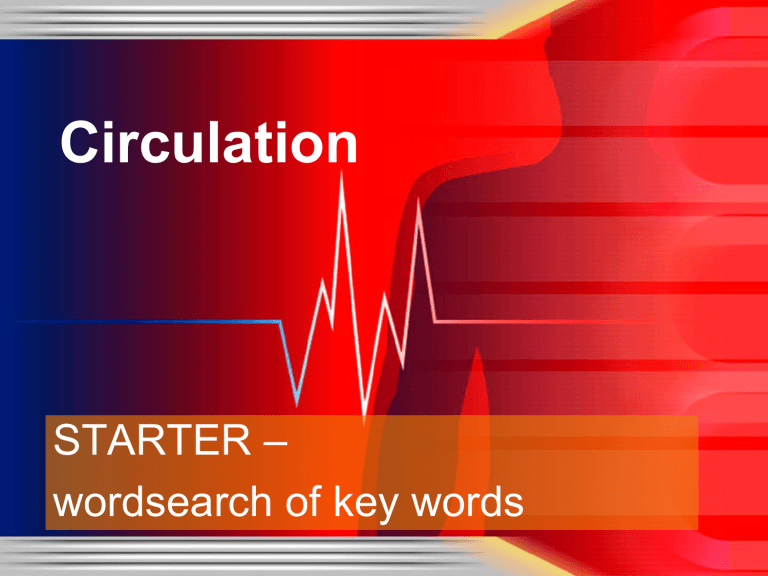
Circulation STARTER – wordsearch of key words Circulation Objective Be able to explain how the heart pumps blood around the body Outcomes Level 4 – Put the labels in the correct place to describe how oxygenated and deoxygenated blood moves around the body Level 5 – Explain how and why pulse rate changes when you exercise/sleep using key words to do with respiration. CIRCULATION cir·cu·la·tion Look at the word CIRCULATION What does the first part of the word sound like? CIRC……. CIRCLE CIRCULAR CIRCULATE Arteries •Have thick walls •Carry oxygenated (red) blood away from the heart to the body •Blood moves at high pressure Veins •Have thin walls •Carry deoxygenated (blue) blood to the heart from the body Capillary •Have thin wallls •Walls are one cell thick •Subtances are able to pass in and out of the blood THIN CELL WALL BODY CELLS RED BLOOD CELLS lungs The dissolved food and oxygen needed for respiration are carried around the body by the circulation system. The circulation system includes the blood, blood vessels, the heart and the lungs. body’s cells Which part of the circulation system carries dissolved food and oxygen to the body’s cells? Oxygenated blood travels from the heart to the body Blood travels from the heart to the lungs Oxygenated blood travels back to the heart Blood picks up oxygen from the lungs and gives out carbon dioxide DEOXYGENATED blood travels from the body to the heart Body cells use oxygen and give blood CARBON DIOXIDE lungs body’s cells 2. Blood picks up oxygen from the lungs and gives out carbon dioxide 1. Blood travels from the heart to the lungs lungs 6. DEOXYGENATED blood travels from the body to the heart 5. Body cells use oxygen and give blood CARBON DIOXIDE 3. Oxygenated blood travels back to the heart 4. Oxygenated blood travels from the heart to the body body’s cells Blood The blood carries oxygen and dissolved food to all the body’s cells so that respiration can take place. useful substances waste products THIN CELL WALL BODY CELLS RED BLOOD CELLS Your beating heart The heart is made of very special muscle called cardiac muscle. This is because it has to keep beating for the whole of a person’s life! If you tried to do the same action repeatedly (like the heart does), your muscles would get tired and after a while stop working. For example, if you keep clenching and unclenching your hand, it will get tired and may even start to get cramp. Why is it important for respiration that the heart keeps beating? EXERCISE Stand up and count pulse for 1 min. When I say go…..do star jumps PROPERLY for 1 minute When I say stop – stand still again and count pulse for 1 minute EXERCISE The body needs to release more energy: so oxygen and sugar (glucose) need to reach muscle cells quickly; so blood is pumped around the body faster; so the pulse is faster. Different types of activity What happens to the pulse rate whilst someone is running and why? What happens to the pulse rate whilst someone is sleeping? Circulation plenary – Wordframe about circulatory system
